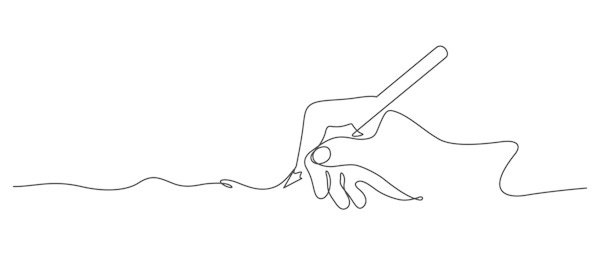Love Is a Neural Pathway – Why Letting Go Can Be So Hard
Five ways to weaken the grip of a romance you need to leave behind
Hi, I’m Caroline – mindset trainer, therapist and storyteller. Each week I publish an article like this one, giving tips on building a healthy, resilient, self-aware state of mind.
Well not quite like this one, actually, as this is my most personal post to date. This isn’t just my story but I speak only for myself. The words reflect my experience and perceptions, and mine alone.
I fell madly, badly in love.
He wasn’t my first boyfriend, but he was my first love. We met when I was 19 and he was 21. The connection was immediate and seismic.
I had zero resistance and my capitulation was total, though perhaps I tried too hard not to show it (I had a horror of being thought wet and clingy).
He fell hard too but, unlike me, he had plenty of resistance. Capitulation wasn’t in his vocabulary, despite rare moments of tender vulnerability that left me undone.
With the benefit of psychotherapy training, I now understand that our attachment styles (as described by John Bowlby and others) were very different, and we were triggered by each other’s styles.
Mine had elements of ‘insecure attachment’. Deeply affected by being sent to boarding school aged nine, I craved presence, communication and reassurance, but didn’t feel confident enough to ask for them in a healthy way.
His style leant towards the more independent ‘avoidant attachment’, often evidenced by him pulling down his shutter and going incommunicado for long periods. He was extremely good at compartmentalising.
He had to go overseas for work for months at a time and was largely silent while away. This created an ongoing agony for me of never knowing whether he might come back to find me on his return. Such was the pull, though, that one or other of us would inevitably get in touch and we’d be off again.
Those circumstances, and the gulf between my needs and expectations and his, didn’t make for a smooth run. Our relationship never had the benefit of a stable rhythm and was more a series of intense, passionate collisions. We may have had love, curiosity and chemistry – oh, the chemistry! – in spades, but only rare glimpses of the crucial building blocks of consistency, truthful communication and confidence in ourselves and each other.
For nearly six years, we limped on, off, and back on again. I sometimes felt as though I only existed in a box in his head; something to be taken out and played with from time to time. I realise I have no real idea what he thought and felt about me.
In between collisions, we distracted ourselves with other people and this came with some hurtful consequences. But somehow we kept finding our way back, though each time a little more damaged, a little more burdened by a mounting collection of emotional bruises.
Eventually, what remained of ‘us’ was a patched-together mess, threaded through with moments of beguiling tenderness. And always, always, that treacherous chemistry.
In occasional flashes of self-awareness, I recognised that:
My largely absent beloved was unlikely – even unable – to step up as I ached for him to do.
He wasn’t the one turning me into a pining creature with few ambitions other than to be with him; I managed that on my own.
He had his own insecurities, some caused by tripping over messes in my life.
While our increasingly rare times together seemed to replenish his tanks, I’d be left feeling sad and depleted by the energetic cost of holding myself together and longing for more that I couldn’t have.
Why is it so hard to do the healthy thing and walk away from a relationship that isn’t serving you?
Because love is a neural pathway.
At rest, our brains use up to 20 percent of the energy in our bodies. If intense processing is involved, energy consumption soars. To offset this high energy cost, our brains have developed ways to increase efficiency.
Welcome to neural pathways.
What is a neural pathway?
It’s a way of automating information processing. In lay terms, it’s a habit.
When we repeatedly think, feel or behave a certain way, the brain cells (neurons) involved in carrying out the repeated activity bond together, forming a roadway (habit) that allows the electrical and chemical signals used in thinking, feeling and doing to move round our brains more quickly and easily. With repetition, the roadway becomes more robust. If we layer deep emotions onto these repeated thoughts and actions, it makes the habit even stronger.
What do we do when we fall in love?
If you’re like I was back then, we think about our person constantly. We pick through memories of meetings and conversations in detail. We daydream. We imagine. We rehearse scenarios and conversations.
And repeat… repeat… repeat…
Throw in the hormones of youth and intense feelings like longing, desire, anxiety and hurt, and it’s hardly surprising that romantic attraction can become such an all-consuming habit.
For some of us, even though we know the situation is damaging, we can’t seem to help ourselves. Rational arguments get bulldozed by hope and the intensity of how we feel. I knew by year three that I needed to grow a backbone and pull out, but my yearning, our chemistry and my “maybe next time it will work,” stories kept pulling me back.
My romantic neural pathway was like a stone channel, carved deep and wide by endless repetition and intense emotion. It had its own gravitational pull and I felt helpless to make the energy flow in any other direction.
Eventually something had to give
After five-and-a-half sporadically blissful but often painful and frustrating years, self-preservation finally triumphed over helplessness. I set a challenge that I desperately wanted him to rise to, but knew in my heart that he almost certainly wouldn’t (or couldn’t).
And I got back what I expected. Silence.
There was no triumph in being proved right.
After that there was no more ‘us’. A finish without a conclusive ending is hard to move past but finally I had a line in the sand. I could take myself off hold and start reclaiming some sense of self I’d abdicated.
What happened to the neural pathway?
It wasn’t a quick process. Even though I was technically a free agent, it was a while before I could consider myself ‘available’.
In time the habit weakened. I went from thinking about him multiple times a day, to once every few days, then weeks, then months, and eventually years.
Gradually the neural pathway silted up, blocked by the detritus of other interests and other people. New pathways took me away from the old road until it almost disappeared from the map.
Almost, but not quite.
Because neural pathways don’t die
Any coach or therapist who tells you they can help you completely erase a habit isn’t giving you all the facts. Once a neural pathway is formed, it’s there for life. For an ex-smoker, there’s no such thing as ‘just one puff’.
The good news is we can weaken a habit and discourage it from derailing us, and we can create new, healthier, more compelling habits to take its place. Further down the page I’ll run through a few ways for you to try.
But it’s important to remember that the ghostly outlines of old habits remain, in the same way that ancient roads and settlements can still be seen from the air.
In the early 2000s, not long after the internet reached the masses, a website called Friends Reunited became the first popular social media site in the UK. A phenomenon known as ‘the curse of Friends Reunited’ spread rapidly, as people who’d dated in high school found each other again, shaking the dust off old, passionate, neural pathways. Many marriages didn’t stand a chance against revived memories of being young and the intoxication of first love revisited.
The internet made reconnecting easy-peasy. I know this, dear reader, because...
More than 20 years later, my first love got back in touch.
I can still feel the full-body shock of that moment.
Curiosity won over common sense and we met for lunch.
Holy fuck. I felt as though someone had taken a giant pressure washer and blasted the debris out of the old neural pathway. In an instant the feeling was just as intense as it had been decades before, only now with the added regret of all the life we’d missed out on.
Our circumstances were different this time around. We were hitting 50 and things were complicated. Having reopened the pathway, we found we were rubbish at plain old friendship but could still do longing, guilt and hurt like champions (or maybe that was just me).
We couldn’t cram the genie back in the bottle so opted for minimal contact. But not having much physical presence in my life didn’t mean he wasn’t firmly back in my head. The pathway was wide open again and my peace of mind was gone.
How did it turn out?
The short version is not well. The original problems were still there, plus a load more.
When our not-a-relationship closed down, in yet another finish without an actual ending, I was initially deeply upset and also furious with both of us for all the wasted time, emotional energy and potential. But training as a therapist is the most useful thing I’ve ever done and I was much better equipped to deal with the aftermath this time.
This what I did:
First I let myself fully experience all the emotion.
Then I made a firm commitment to change my approach and stop looking through the lens of past pain. I vowed not to let past unhelpful habits and hurts (mine or anyone else’s) contaminate my chances of being part of a deeply loving, satisfying and mutually supportive relationship in future.
I embraced and accepted that such a relationship might never happen – and I’m truly OK with it. I have a full, satisfying life and although it would be wonderful to be in a strong, intimate partnership, I don’t need one.
I started playing with different ways to weaken and reroute the pathway, like putting energy into building new creative, enjoyable and healthy habits.
I decided to invest in relationship training to help me recognise and deal with my sabotage patterns.
It took quite a few months but I was able to reclaim my peace of mind more quickly than I expected. I’m no longer who I was in that relationship. The old neural pathway has a different shape now and I have no fear that it might derail me. In fact the experience made me stronger, more self-aware and more in touch with what I want, and what I deserve.
If you’re struggling to let go of an old love, try these ‘moving on’ methods that worked for me:
1. Weaken the old habit.
Thinking about the person constantly and revisiting old memories and hurts again and again only reinforces the neural pathway. Remember, repetition plus emotion strengthens a habit.
Obviously part of saying goodbye involves grieving. But instead of allowing the person free rein in your mind, when thoughts, memories and feelings flood in, acknowledge them, then consciously let them go. If you’re a visual person, try imagining each thought, emotion or urge as a bubble floating away, or a cloud dissolving in a blue sky. Use whatever ‘disappearing’ imagery works for you.
NB: by letting a thought go, I don’t mean pushing it away. Trying to avoid a thought can actually focus your unconscious mind on it instead. If I say, “Don’t think of a white horse galloping through a field!”, in he charges, white tail streaming. But with letting go, you’re not resisting the thought; you’re acknowledging it and choosing to release it. This sends a very different message to your mind than, “I mustn’t think about xxx!”.
It takes consistent effort but if you consciously let go each time you feel memories and emotions crowd in, they’ll start to arrive less often. Keep at it and you may soon find yourself feeling more accepting of what has been, and better able to move on.
2. Build compelling new habits.
Your brain has the amazing quality of neuroplasticity, meaning you can change the way you’re wired. One of the most effective ways to weaken old neural pathways is by creating new habits that are healthier, more interesting and more fun.
Try learning a new skill, getting fit, or ramping up a creative activity that requires concentration. When you put energy into acquiring or improving a skill, old pathways can wither from lack of reinforcement. I discovered a new passion for walking in nature and found joy in creative adventures like silver-smithing and song-writing.
I strongly advise you don’t jump straight into another relationship. We need time to process what’s happened, absorb the learning and rebuild our resilience. If we leap too soon, we risk being retriggered, dragging our baggage into the new situation and reactivating destructive patterns.
3. Practise mindfulness
Focusing on the present moment, not on past memories or anxiety about the future, is a great way to train your mind to think in new ways.
We spend our whole lives living in the present but often not really noticing it, because our minds are elsewhere. If you practise paying attention to ‘now’ and making now as meaningful as possible, you can prevent old neural pathways from taking charge. Honour the now!
4. Seek professional support
Relationship therapy has come a long way. In addition to individual and couple’s therapy, there’s a multitude of books and courses to explore. John and Julie Gottman, Esther Perel and Jaime Bronstein are a few names that come to mind.
Certain types of talking therapy, such as cognitive behavioural therapy (CBT), can help us rewire unhelpful thoughts, emotions and behaviours and weaken those old, unwanted pathways. If you’d like to explore this option, send me a message through Substack or put “please contact me” in the comments and I’ll reach out to you.
5. Edit the old neural pathway.
This one’s a bit more advanced and maybe best done with guidance from someone with experience.
Basically you exploit the fact that you already have an embedded neural pathway and rebuild it by adding new beliefs, feelings and behaviours to the old story. Again, this technique takes advantage of neuroplasticity to rewire your brain and create new neural connections. I had fun with it and was surprised and happy at how effective it proved to be.
Well that’s it for this week.
This is by a long way the most personal story I’ve aired on Substack. It’s been on my list of posts to write for over a year but felt like too much of a vulnerable share until recently. I hope it’s given you some ideas on how to tackle your unhelpful neural pathways, whether romantic or not.
I’d also love to hear about your experiences of moving on from heartbreak. What’s worked to help you recover and move forward? Please do share in the comments.
Until next week, much love and take care,












Thank you for your post and your vulnerability Caroline. Very close to home for more words; will hang on to your techniques. 💝🤗
Wonderful article, Caroline. I wish I'd read it 25 years ago when a disastrous affair with a man who left for Spain left me pining for far too many years, but at the same time, ruminating with regret and guilt about what I'd done in nearly wrecking my family and marriage......